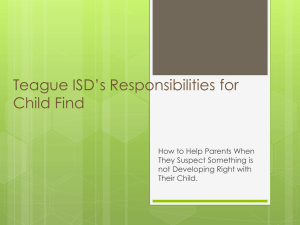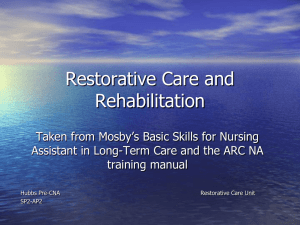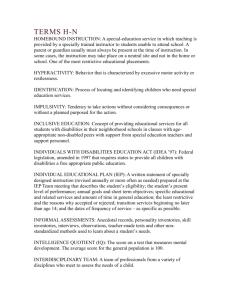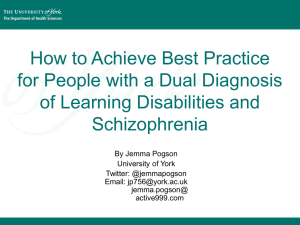As South Africa transitioned to democracy, the Mental Health Act
advertisement
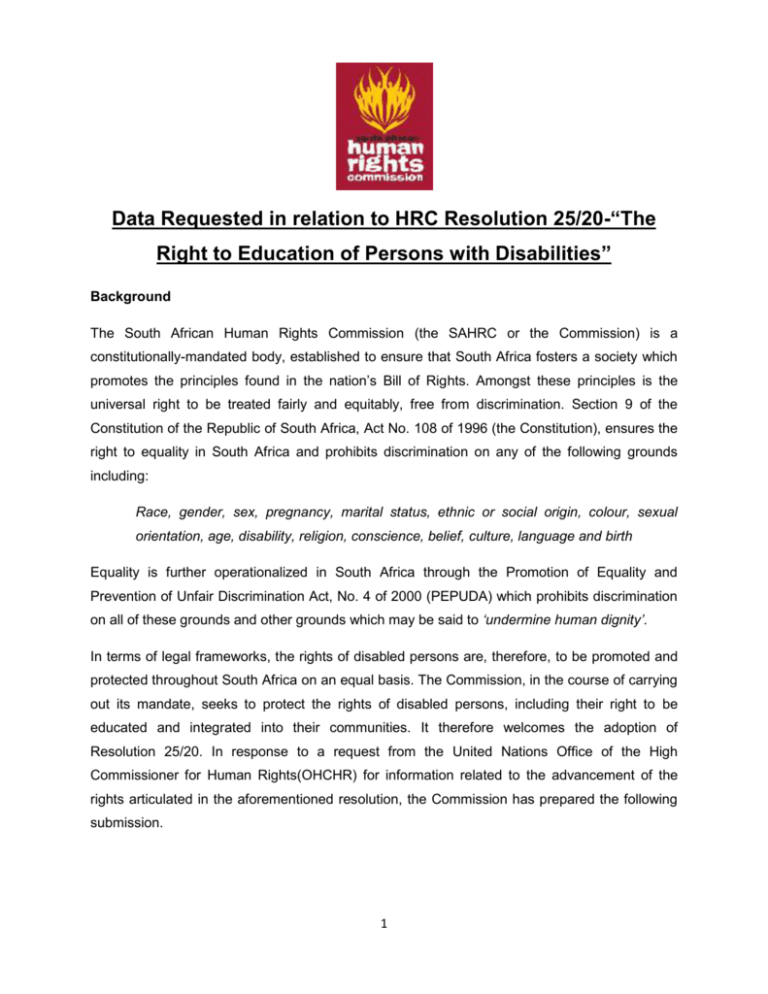
Data Requested in relation to HRC Resolution 25/20-“The Right to Education of Persons with Disabilities” Background The South African Human Rights Commission (the SAHRC or the Commission) is a constitutionally-mandated body, established to ensure that South Africa fosters a society which promotes the principles found in the nation’s Bill of Rights. Amongst these principles is the universal right to be treated fairly and equitably, free from discrimination. Section 9 of the Constitution of the Republic of South Africa, Act No. 108 of 1996 (the Constitution), ensures the right to equality in South Africa and prohibits discrimination on any of the following grounds including: Race, gender, sex, pregnancy, marital status, ethnic or social origin, colour, sexual orientation, age, disability, religion, conscience, belief, culture, language and birth Equality is further operationalized in South Africa through the Promotion of Equality and Prevention of Unfair Discrimination Act, No. 4 of 2000 (PEPUDA) which prohibits discrimination on all of these grounds and other grounds which may be said to ‘undermine human dignity’. In terms of legal frameworks, the rights of disabled persons are, therefore, to be promoted and protected throughout South Africa on an equal basis. The Commission, in the course of carrying out its mandate, seeks to protect the rights of disabled persons, including their right to be educated and integrated into their communities. It therefore welcomes the adoption of Resolution 25/20. In response to a request from the United Nations Office of the High Commissioner for Human Rights(OHCHR) for information related to the advancement of the rights articulated in the aforementioned resolution, the Commission has prepared the following submission. 1 1. Is your country currently reviewing or has it reviewed laws (i) denying or restricting the exercise of legal capacity; (ii) allowing for forced institutionalization; (iii) establishing a presumption of danger to self or others on the basis of disability; (iv) providing for social protections and medical institutions that include segregated settings for living? Among the legislation which governed the treatment of people with disabilities in South Africa was the Mental Health Act, No. 18 of 1973 (as amended). This act emphasised institutional and custodial care over care in the community. In addition, it distributed resources unevenly across races. The Act further allowed for forced institutionalisation as well as determination of danger, though it was criticised for its excessively authoritarian nature. According to McCrea, Specifically, [the Act] has been criticized because: (i) It only required a reasonable degree of suspicion to be certified to a mental institution; (ii) Individuals could be denied their freedom and placed in a mental facility based on prejudices and vendettas. In fact, finding someone mentally incapable was sometimes utilized solely for political means in the apartheid era. Freedom fighters were often silenced by being placed in a mental facility; (iii) Once deemed mentally ill and certified, patients went without the assistance of the law, and could spend a considerable amount of time in the mental institutions against their will; and (iv) Patients did not have a significant right of appeal or representation.1 As South Africa transitioned to democracy, the Mental Health Act was increasingly criticised for its human rights implications. A decision was taken in 1996 to draft new legislation which protected the rights of persons with mental illnesses and intellectual disabilities. In 2002, this 1 McCrea, N.L. (2010). An analysis of South Africa’s Mental Health Legislation.Accessed on the 14 th of July, 2014 from http://www.natlawreview.com/article/analysis-south-africa-s-mental-health-legislation. 2 new legislation was passed as the Mental Health Care Act, No. 17 of 2002 (the MHCA), which was officially enacted on December 15th, 2004. The MCHA seeks to: i. Shift the system from a past custodial approach to one encouraging community care; ii. Make certain that appropriate care, treatment and rehabilitation are provided at all levels of the health service; and iii. Highlight that individuals with mental disabilities should not be discriminated against, stigmatized or abused.2 The MHCA is clear that only individuals suffering from mental illness are eligible for involuntary care. According to the Act, an involuntary mental health user must be provided with care, treatment and rehabilitation at a health establishment if at the time of application, there is a reasonable belief that the mental health care user has a mental illness and is likely to cause serious harm to their person or others. The presumption of danger must be agreed upon by at least two health care professionals, whereafter a 72 hour observation period is mandatory to ensure confirmation of the diagnosis as well as any restriction of legal capacity. The decision may also be appealed by means of the Mental Health Review Board. In terms of independent and protected living and psychosocial rehabilitation, the National Health Policy Guidelines for Improved Mental Health in South Africa’ were developed in 1997. Read in conjunction with the ‘White Paper for the Transformation of the Health System in South Africa’, there is a clear prioritisation of community care and human rights based approaches to mental health. Unfortunately these policy guidelines were never adopted as formal policy. According to Simpson and Zambuko3, the National Directorate: Mental Health and Substance Abuse is, at present, drafting a new national policy for the social protection and segregated living needs of people with disabilities. However, this has not yet materialised. 2 Ibid. Simpson B &Sambuko T. (2011). The Psychosocial Rehabilitation Needs of Residents of a Half -Way House for Mental Health Care Users in Durban, South Africa. International Journal of Psychosocial Rehabilitation, 15, 2, 6978. 3 3 2. Does your country currently have or is it developing a programme or plan to promote the implementation of services enabling independent living such as: personal assistants, home assistants or other community based services regardless of the kind of impairment? In order to give effect to the right of persons with disabilities to move freely and with independence, the government has established the National Rehabilitation Policy (2006) and guidelines for the standardization of funding for assistive devices.4The provision of assistive devices is prioritised on rehabilitation budgets. The Western Cape Rehabilitation Centre is the only training centre with wheelchair seating in South Africa. The Department of Social Development has undertaken to ensure that every province should have at least one such centre.5 The South African Disability Development Trust (SADDT) receives part-funding through government subsidies. It plays a pivotal role by providing assistive devices that are vital to maintain or retain employment whether in the open labour market or for self-employment purposes.6 The Department of Public Services and Administration has stated that it is in the process of finalising the policy on reasonable accommodation and assistive devices, which will bring uniformity across the public service for provision of assistive devices, personal assistance services and technology for public servants with disabilities. 7 With regard to the plans and sources of payment, accurate and updated statistics are not available. At present, plans are 4 Department of Women, Children and People with Disabilities.(2013). Baseline Country Report to the United Nations on the Implementation of the Convention on the Rights of Persons with Disabilities in South Africa. 5 Ibid. 6 Ibid. 7 Ibid. 4 being made to include statistics related to assistive devices on the District Health Information System.8 3. Does your country have effective mechanisms that persons with disabilities could successfully employ in case of denial of access to services enabling independent living and inclusion in the community including access to facilities for the general population on an equal basis with others? Access to services as a whole remains a considerable challenge in South Africa, particularly for the poor. While the broader question of access to services is a question of socioeconomic rights, denial of services or any other discrimination on the basis of disability is an equality issue. Section 9 of the Constitution prohibits discrimination on the basis of disability, and this would extend to any unequal provision of social security, a right to which, in terms of Section 27 of the Constitution, ‘everyone’ is entitled. The Department of Social Development (DSD) is the custodian of South Africa’s National Disability Policy. Key principles of this policy include: i. The right to self-representation; ii. Accessibility; iii. The advancement of a support system of organisations and institutions which (in addition to the family)is intended to assist persons with disabilities to claim their rights; iv. Self-respect and self-sufficiency; v. Access to appropriate services; vi. Social integration; vii. Enhanced inter-sectoral collaboration.9 8 Ibid. Department of Social Development.(n.d.). National Disability Policy.Accessed on the 15th of July, 2014 from http://www.westerncape.gov.za/assets/departments/social-development/national_disability_policy.pdf. 9 5 These provisions are aligned to the UN Standard Rules on the Equalisation of Opportunities for People with Disabilities and, therefore, place the right to equality firmly within their scope. As a national human rights institution (NHRI), the Commission is one of the avenues which persons with disabilities may make use of if their right to equality has been violated. The SAHRC receives complaints from individuals and groups, and also has the ability to conduct investigations on its own initiative when the need arises. In the previous financial year (ie. April 1st, 2013 to March 31st, 2014), the Commission handled a total of 72 complaints from persons with disabilities who felt that their right to equality was violated. This represented 13% of all equality complaints. The Commission uses a number of mechanisms, including alternative dispute resolution to finalise matters, but may also institute matters in court. PEPUDA establishes equality courts to offer access to justice where the rights of vulnerable groups have been affected. A total of 382 equality courts exist throughout South Africa, and each magisterial district court may function as an equality court. Legal representation is not required and the timing provisions of these courts are designed to promote swift resolution. However, in the course of its own research and monitoring activities, the Commission has found that these courts are severely under-utilised, that awareness of their existence is poor, and that reliable statistics are difficult to obtain. This renders any conclusion about the equality courts as avenues for accessing justice for persons with disabilities open to re-examination. Nonetheless, the existence of this court as well as the Magistrates and High Courts may also serve to address equality matters and represents a sound framework upon which to build in future. 4. Is your country involved in international cooperation programmes ensuring the right to live independently and to be included in the community? The Constitution stipulates that when interpreting and applying the provisions of the Bill of Rights, particular attention should be given to international laws and treaties.10South Africa has 10 See note 4 above. 6 ratified most of the African regional instruments as well as the international human rights instruments in the area of economic, social, cultural, civil and political rights.11 South Africa acknowledges the importance of international co-operation in support of national efforts towards the implementation of the Convention on the Rights of Persons with Disabilities (CRPD). This cooperation should be inclusive of persons with disabilities.12 The implementation of inclusive education and training system was funded by the Finnish and Swedish governments. The Sweden-SA cooperation was mostly in the area of teaching and advocating for inclusive education and democracy. The South Africa- Finish cooperation programme in the Education Sector was to provide support in the implementation of the Education White Paper 6 in 21 mainstream schools in South Africa. The mutual exchanges and information sharing not only benefited South Africa but as well as Sweden and Finland.13South Africa is also an active participant in the Japan International Cooperation Agency (JICA) programmes focusing on empowerment of persons with disabilities and mainstreaming disability as a whole.14 South Africa is a member of the Network of African Human Rights Institutions (NANHRI) and hosted the 8th Biennial Conference of NANHRI in 2011. The theme was “Advancing the Human Rights of older persons and persons with disabilities; the role of the National Human Rights Institutions.15” The overall objective of the conference was to identify strategies and methods to strengthen the capacity of Africa’s National Human Rights Institutions (NHRIS) and to promote and protect the rights of older persons and persons with disabilities. The Conference culminated into the signing of the Cape Town Declaration which amongst others resolved to strengthen the role of Africa’s NHRIS, state parties and society and other stakeholders in the promotion and protection of the rights of older persons and persons with 11 Ibid. Ibid. 13 Ibid. 14 Ibid. 15 Ibid. 12 7 disabilities; encourage governments to ratify, domesticate and implement international, regional human rights instruments and obligations concerning the rights of older persons and persons with disabilities. 5. Does your country collect statistics and disaggregated data on services provided to ensure independent living and inclusion in the community? South Africa’s Baseline Country Report on the Implementation of the CRPD highlighted the following statistics in relation to compliance with Article 19 of the Convention (ie. Living independently and being included in the community): i. The Department of Social Development subsidises a total of 149 NGO-managed residential facilities, catering for 7982 persons with disabilities; ii. Supported/assisted living and independent living programmes constitute a move towards units/homes that are more open, smaller and within the community to facilitate deinstitutionalisation; iii. The Social Assistance Act, No. 13 of 2004, provides for an additional grant-in-aid for disability grant recipients who require full-time care by another person owing to their impairment. If a child with a disability is to be cared for in the home, parents or guardians are able to access a care dependency grant.16According to the South African Social Security Agency, a total of 86970 grants-in-aid and 122 813 care dependency grants were dispersed in May 2014.17 Unfortunately, no other data disaggregation takes place at present in relation to independent living or community-based rehabilitation. Conclusion 16 Department of Women, Children and People with Disabilities.(2013). Baseline Country Report to the United Nations on the Implementation of the Convention on the Rights of Persons with Disabilities in South Africa. 17 South African Social Security Agency. (2014). Fact Sheet-Issue No. 5 of 2014: A statistical summary of social grants in South Africa. Accessed on the 15th of July, 2014 from http://www.sassa.gov.za/index.php/statistical-reports. 8 The information provided above demonstrates that while there have been some notable developments in the promoting compliance with the CRPD, there remain significant challenges in ensuring that the rights of persons with disabilities to live independent lives characterised by dignity are fully realised. The Commission reaffirms its support for Resolution 25/20 and welcomes efforts to ensure that persons with disabilities are treated equitably and fairly. It furthermore wishes to congratulate the OHCHR for undertaking the necessary supportive work to ensure that all persons with disabilities, in South Africa and throughout the world, are provided the opportunity to live independently within their communities. The Commission thanks the OHCHR for the opportunity to collaborate on this important initiative and further commits itself to the promotion of the rights of persons with disabilities. Should the OHCHR require any further information, the Commission commits itself to providing the necessary assistance. 9


